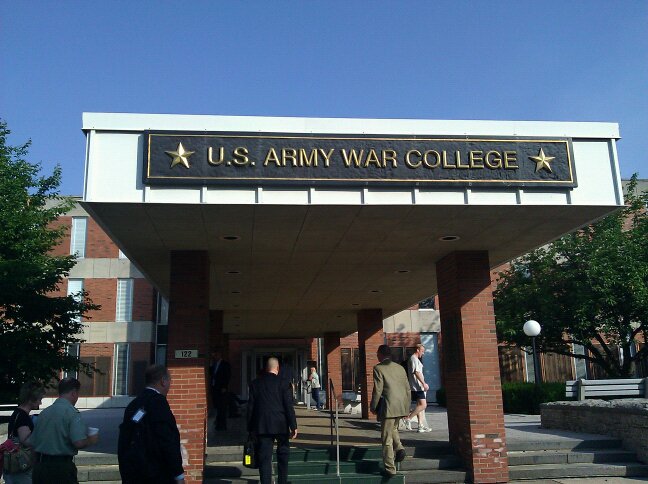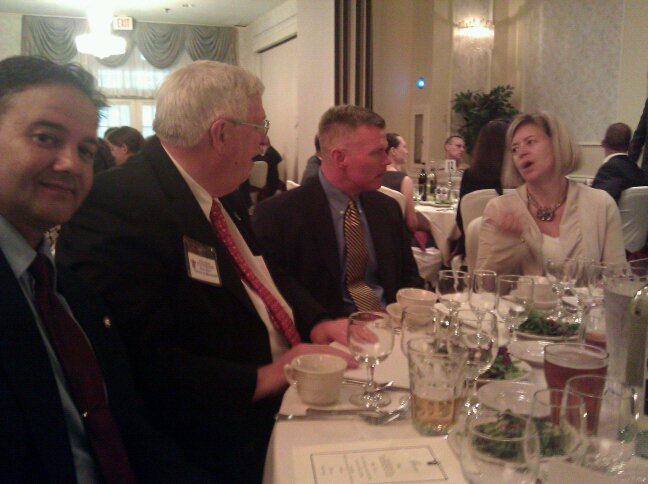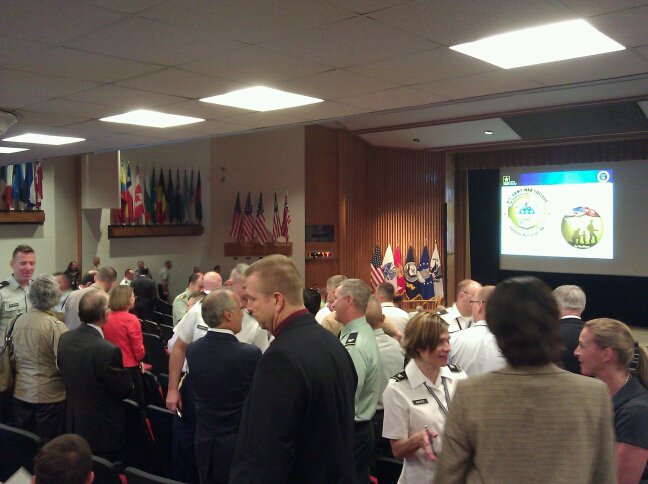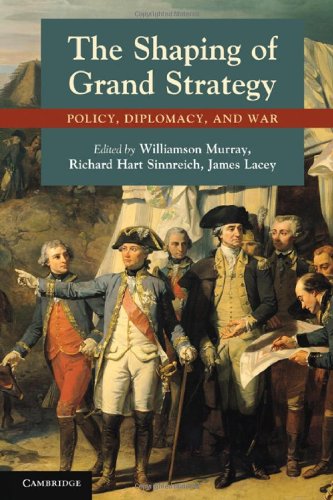Sunday, July 3rd, 2011
Gifts from a generous Meatball:


Hardcovers too. Nice.
The Party: The Secret World of China’s Communist Rulers by Richard McGregor
Monsoon: The Indian Ocean and the Future of American Power by Robert D. Kaplan
I have already dived a few chapters into the McGregor book and it is very good. What makes it good is that is running counter to the message of the herd in terms of popular Sinology, which is to emphasize that China is a) uniquely Chinese with deeply introspective Confucian civilizational traditions (that’s modern PC-speak for “inscrutable”) and b) the brave new world of liberal, globalized, capitalism with a benign technocratic face.
Now there’s important truths in both of the popular mass messages on China, incompatible as they can be with one another. The economic rise of China in a globalized economy is the most important story of the last quarter of the 20th century and the first quarter of the 21st ( collapse of the USSR is second; the Soviets were beaten before they imploded and imploded largely because they knew they were beaten). China is also not like America, not even when they imported stock options, blue jeans, McDonald’s and the American jobs that used to create all those things. China’s civilization is truly of a dizzying depth, complexity and scale that is best compared to Europe rather than a specific country. That in itself, is important because it points to how ignorant the average American policy maker is, never mind the average American, about what makes their Chinese counterpart tick.
[ Sidebar: Perhaps the Obama administration assembling a new senior “China/East Asia” diplomatic and national security team that does not include a single official with any professional knowledge of China was unwise? How is that better than the Bush II administration shunning Arabists during the run up to and occupation of Iraq? It is not that these diplomats and officers are poor, they are smart and experienced, but none of them are China specialists. Or Japan specialists, for that matter and only one has expertise in Korean affairs. These are the region’s great powers! This is like turning EU/NATO policy over to diplomats who speak Hindi and Swahili ]
What McGregor is doing in The Party that is important is reminding Westerners that the Soviet experience, particularly the Leninist Party model, is still deeply embedded in China’s political DNA. Not in an ideologically Marxist, Khrushchevian, shoe-pounding sense but in a functional sense. In a structural sense. In an instrumental governance sense. In a networking theory sense. And all these characteristics, which are largely innately hostile or indifferent to the values of liberal democracy, continue to shape Chinese policy, leadership succession, national security, defense strategy and geopolitical outlook to this day.
That doesn’t mean China is itching for a war with the United States, but it means they are playing a longitudinal strategic game where the first goal is to stay in power forever and the next is to advance one’s position relative to others.
We are the other.
China is not an enemy but she is no friend or ally of the United States either, yet it is the most important relationship the US has to manage for the next thirty years – and that relationship in a strategic context with rising India, Japan, South Korea and Australia.
It might help if America brought a team to the table that included people who could tell Han Fei Tzu from Mencius or spoke Chinese.
Posted in 20th century, 21st century, America, analytic, asia, authors, book, capitalism, china, Communism, DIME, diplomacy, economic determinism, economics, geopolitics, globalization, government, ideas, India, intellectuals, japan, national security, networks, obama, politics, social networks, soviet union, strategy, Swedish Meatballs Confidential, Uncategorized | 6 Comments »
Saturday, June 25th, 2011
From Thomas P.M. Barnett and Wikistrat:
Grand Strategic Competition Update (Week 2)
…As head judge, I assign points to teams based on their activity throughout the week. In this second week, each team generated those two trajectories to the tune of about 10,000 words each, or close to 300,000 words across all the teams. Naturally, a ton of interesting nuggets emerged, so here’s my hit list of provocative ideas.
1) US turns back toward Western Hemisphere as part of reduced global footprint, need to deal with drug/crime nexus, and desire to balance growing Chinese influence across region (BRAZIL1/Institute of World Politics 2)
Every new US president hits the ground running with the promise to pay more attention to the Western Hemisphere – and then promptly forgets the entire idea. So far, Barack Obama has held to form, and yet the dynamics cited here make for a compelling argument. A US that pulls back from the world and gets it own house in order must certainly look southward for some of its solutions – particularly on the disastrous drug war. Brazil, as the IWP2 team points out, is the key dynamo of the region, so either the US recognizes that and accommodates Brazil’s ambitions, or it may find itself the odd man out throughout South America…
Time’s Battleland: Future grand strategists: Russia will someday be forced to outsource its security
Hailing again from Wikistrat‘s International Grand Strategy Competition (30 teams of grad students/interns from elite universities and think tanks around the world), where I serve as head judge (and I get paid), I wanted to share the decidedly provocative vision of Russia’s long-term future security paradigm as crafted by the New York University team (find their national trajectory here). A certain segment of the US national security establishment got all jacked by Russia’s short war with tiny Georgia in August 2008, seeing in that raw display of power a “resurging” military superpower. NYU begs to differ…
Shades of Chet Richards and Steven Pressfield.
Posted in barnett, DIME, strategist, strategy, Wikistrat | Comments Off on Barnett on Wikistrat’s Grand Strategy Competition and…well…Grand Strategy
Wednesday, June 22nd, 2011
Major Michael Few had a short theoretical post that sparked an important discussion at SWJ Blog and other social networking sites. He’s wrestling with the military-tactical effects of diminishing returns. Well worth your time to read through:
Less is Often More?
This is a post that I never would have written while practicing the art in Iraq. On the ground level, every commander wants more forces. In fact, one of the unstated prerequisites for command is that you must conduct at least one daily bitching session where you emphatically describe how much more effective you could be if you were given another platoon, company, battalion, etc…
– More forces equal more villages and more neighborhoods you can clear and occupy.
– More forces equal more visible power and control.
– More resources equal more money to bribe your enemies.
But, sometimes more is actually less:
– More forces mean that you can act unilaterally and just ignore the impotent host nation security forces.
– More forces mean that you can coerce and bully the corrupt political leaders.
– More resources mean that you may waste money building elaborate schools and medical clinics and digging canals rather than repairing the existing suitable structures.
Sometimes with more, we merely attack the symptoms creating short-term visible gains rather than attacking the root problems. Doctrinally, we would call this creating maneuver space on the human and physical terrain.
Read the rest here.
Posted in COIN, complexity, counterinsurgency, counterintuitive, DIME, ideas, intellectuals, leadership, military, organizations, Patterns, Questions, risk, security, small wars journal, social science, society, state building, swj blog, Tactics, theory, war, warriors | 2 Comments »
Sunday, June 12th, 2011

As noted previously, I was fortunate to attend the National Security Seminar at the the US Army War College this year and wanted to relay my impressions while they were still fresh.
First, in terms of reception and cordiality, I have rarely experienced such an extensive and personal outreach as was demonstrated by the War College staff, faculty, administration and students. Every new member had a “sponsor” – a student, usually a colonel or Navy captain, who acted as a liason and personal guide from the time their plane touched down until the moment they returned to the airport. My sponsor, the former commander of the Wolfhounds, Colonel Richard “Flip” Wilson, whom I consider a friend, really extended himself on my behalf, making me feel welcome and a full member of Seminar Group 20. Most of the students have multiple tours of duty in Iraq and Afghanistan under their belt and many can report the same for the first Gulf War, Panama, Bosnia or Kosovo.
The War College, the Commandant and the Seminar Group all hosted receptions and dinners designed to get students and civilian new members to mix and further discuss issues raised in the seminar sessions or lectures. At these events I had the opportunity to meet and talk to the leadership of the Army War College including the Commandant Major General Gregg Martin, the Deputy Commandant for International Affairs, Ambassador Carol Van Voorst, the Executive Director of the Army Heritage Foundation, Mike Perry, the Director of SSI, Dr. Douglas Lovelace, the Chief of Staff and numerous faculty and seminar members. The New Members such as myself were exceedingly well fed at these events as I suspect the Army was attempting to prove that it really does march on it’s stomach.


The serious business of the National Security Seminar was divided into two segments, the talks given by distinguished speakers to the entire class of 2011 and the New Members and the Seminar Group sessions of approximately twenty students, New Members, academics and foreign visitors. We received a brief on the war in Afghanistan from the ISAF Chief of Staff, who was standing in last minute for General Petraeus who was called to meet with senior adminstration officials; and a very interesting concluding talk by Foreign Affairs Editor Gideon Rose, author of How Wars End, which covered issues of strategy, grand strategy and the disconnect with policy.

The National Security Seminar is run strictly on a non-attribution basis, in order to encourage candor and frank exchange of views, which handicaps my ability to discuss specifics here. I can say that my views on Pakistan ( which I compared to “North Vietnam” ) riled more than a few people – Pakistan is the only country in the world given 2 exchange student slots at the Army War College at the request of the most senior leadership of the US Army – and several students and faculty members took the time, outside of seminar sessions, to make certain I heard countervailing POV regarding Pakistan’s value as an ally. Other topics included, but were not limited to:
Defense budget cuts and force structure
Narco-cartels in Mexico: Insurgency or No?
Civil-Military Relations
Repeal of DADT
AfPak War
al Qaida and GWOT/US Strategy
COIN
Critical thinking and Leadership
Logistics
Libya and NATO
AWC Strategy Curriculum/Program
What the US public expects from their military
China as a peer competitor
Effects of ten years of war on officer corps/military
Illegal combatants and international law
PTSD
Battle of Gettysburg and Grand Strategy
Cyberwar
Differences in Armed Services strategy, command climate, discipline, leadership
The Arab Spring
US Global leadership and Economics
Interagency Operational jointness
Most of the discussion took place in the seminar groups, with Q&A periods in the mass sessions with featured speakers. I came away deeply impressed with the seriousness and insights as practitioners that AWC students brought to the table. The AWC strategic studies program seeks to broaden students who are assumed to arrive with tactical expertise and prepare them for higher command that carries operational, strategic and even policy responsibilities (at least in terms of interpreting and executing within policy guidelines). Many students were articulating ideas associated with Thomas P.M. Barnett, the “mission order” and “commander’s intent” style of leadership or Clausewitzian strategic premises during debates and discussion.
The National Security Seminar Week was for me, an enlightening and exceptionally enjoyable experience, one I would highly recommend to readers who may have such opportunities in future years.
Posted in 19th century, 2011, 20th century, 21st century, 3 gen gangs, 4GW, academia, Afghanistan, Air Force, al qaida, America, army, barnett, Clausewitzian, cognition, COIN, counterinsurgency, Cyberwar, defense, DIME, diplomacy, diplomatic history, education, Epistemology, foreign policy, government, historians, history, ideas, insurgency, intellectuals, intelligence, leadership, metacognition, military, military contractor, military history, military intelligence, military reform, national security, Network-centric Warfare, organizations, security, social science, strategist, strategy, Strategy and War, Tactics, theory, war, warriors | 12 Comments »
Tuesday, May 24th, 2011

The Shaping of Grand Strategy: Policy, Diplomacy, and War by Williamson Murray, Richard Hart Sinnreich and James Lacey (Ed.)
by Williamson Murray, Richard Hart Sinnreich and James Lacey (Ed.)
As readers of this blog know, grand strategy is an important and timely subject that speaks directly to the difficulty American leaders have had in navigating the ship of state in the waters of the international arena. The Shaping of Grand Strategy: Policy, Diplomacy, and War by Williamson Murray, Richard Hart Sinnreich and James Lacey (Ed.) and contributing authors Colin S. Gray, Marcus Jones, Jeremy Black and John A. Lynn III postulates what grand strategy is and explain from historical case studies how statesmen struggled to fashion one in peace and war.
by Williamson Murray, Richard Hart Sinnreich and James Lacey (Ed.) and contributing authors Colin S. Gray, Marcus Jones, Jeremy Black and John A. Lynn III postulates what grand strategy is and explain from historical case studies how statesmen struggled to fashion one in peace and war.
The Shaping of Grand Strategy has a number of strengths to recommend it to the serious student of history or strategic practitioner:
Focus: The case studies are all anchored in the Westphalian state system starting with the early modern period of European absolutism and apex of “national” monarchies and transitions through a Bismarckian 19th century to finish with the West’s cataclysmic 20th century battle with totalitarianism. This gives the chapters by different scholars a sense of cohesion and chronological succession.
Balance: The Shaping of Grand Strategy gives scholarly treatment from both the theoretical, strategic studies perspective as well as the historical case study. I learned some things about Louis XIV’s Europe and the Great Britain of the Pitts and the Hanoverian dynasty of which I was unaware. Theory bookends history in this tome.
Nuance: Each scholar gives his subject an adult treatment. Controversial points are interesting rather than shrill and each author engages an impressive synthesis of historiographic material as they cover a broad ground in investigating grand strategy. Each chapter is sound and engaging.
Limitations, such as they are, to be considered:
Absent: Powerful non-Western case studies. The ancient world. Revolutionary war (French, Soviet or Islamist insurgent) as a grand strategy. Geoeconomics asnd political economy as a foundation for grand strategy.
Weak: Insufficient treatment of the impact of nuclear weapons and deterrence on grand strategy, which frankly deserved a chapter of it’s own.
If you are composing a syllabus for a class on grand strategy or strategy, The Shaping of Grand Strategy would serve as an excellent generalist core for the course, supplemented by cognate, specialist or subtopical readings.
Some things that struck me while reading The Shaping of Grand Strategy:
- Colin Gray’s distillation of the strategic dilemmas faced by Truman and an almost Boydian implicit explanation of what grand strategy is and why it needs a compelling moral power:
High policy does not emerge in a vacuum, though it can be invented in a hurry without much forethought when necessity presses. Policy requires a North Star for guidance that can inspire, yielding to would-be leaders the fuel they require to recruit and satisfy their followers
- James Lacey’s realistic and granular treatment of the relationship between military strategy and grand strategy in the WWII Anglo-American Alliance and his generally admiring assessment of FDR as a strategist vs. a critical treatment of George Marshall.
- Marcus Jones’ emphasis of the importance of the strategist himself and the uncertainty of decision making in his chapter on Otto von Bismarck.
- The drawing of historical parallels with today by John Lynn and Richard Sinnreich as well as the investigation of the reasons for grand strategic failure of British appeasement by Williamson Murray.
The Shaping of Grand Strategy is a tight, concise and focused academic book that furthers the discussion of grand strategy by providing coherent and detailed examples as well as a readable an interesting analysis from which both the professional or the the student can profit.
Strongly recommended.
Posted in 17th century, 18th century, 19th century, 20th century, 21st century, academia, authors, book, DIME, diplomatic history, europe, foreign policy, geopolitics, historians, ideas, intellectuals, military, military history, national security, strategist, strategy, Strategy and War, Uncategorized | 6 Comments »









